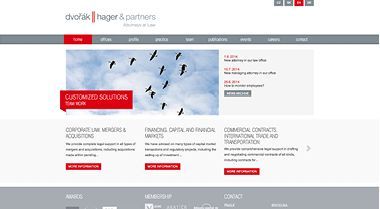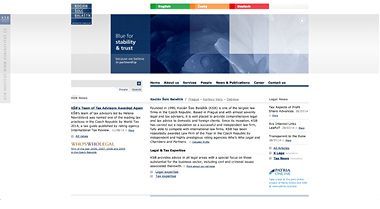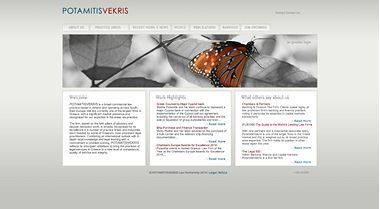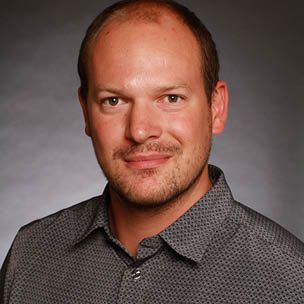“Back in Prague! Re-charged with new knowledge about international business law from one of the world’s top ranked law schools and a London living and studying experience, and eager to start a new chapter at Accenture’s Legal Global Services!” is the way Alan Neradny, Country Legal Counsel at Accenture, Czech Republic, describes himself.
Prior to joining Accenture 7 months ago, Neradny pursued an LLM at the London School of Economics and Political Science. Before that he spent 9 years with Kenvelo as its General Legal Counsel and HR Director, preceded by 3 years with Tatra banka as its expert lawyer.
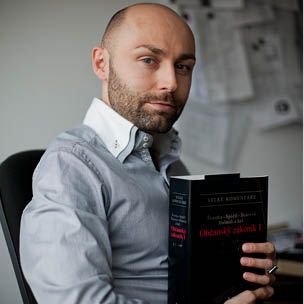
Alan Neradny, Country Legal Counsel / Local Country Interface / Prague CORE Team Coordinator at Accenture
CEELM: To start, please tell our readers a bit about your career leading up to your current role with Accenture.
A.N.: It seems quite a natural progression, really. In 2001, after having completed my compulsory military service as a Legal Services Officer, I applied for several legal roles. One of the companies I was then in touch with was Tatra banka, a member of Raiffeisen Bank International and Slovakia’s most pioneering banking institution. It was “love at first sight,” so to speak. I very much appreciated the wide ranging nature of the role, especially the provision of legal support for payment cards and e-banking, as well as the overall ambience of the company, particularly the head of legal services who interviewed me: a young, committed, friendly, and open-minded woman. She truly liked my genuine, unspoiled enthusiasm for work and my passion for learning. And neither of us was disappointed. Over three happy years with the bank, I took each and every opportunity, training, or assignment offered. In addition to my regular agenda, I also volunteered to advise independently on large-scale international projects and the bank’s innovation initiatives.
However, drawn to working within a broader and more diverse international environment, I applied for a senior legal position at the Prague headquarters of the KENVELO Group prime regional retailer. My proposal led to a successful nine years’ marriage, during which I served under three different shareholders. After an acquisition and subsequent restructuring by Italian investors in 2006, I became the Group’s Legal Counsel, with a focus on pre-emptive and business-oriented legal support across the entire CEE region. As was the case in the bank, lawsuits were not a desirable solution, and their prevention or settlement at an early stage was strongly preferred.
I inherited the legal department at its peak, then comprising of seven lawyers in Prague and a similar number in other territories, with a strong drive for growth. Throughout those nine years, compared to the highly specialized banking position I had had before, I got a taste of the full range of legal issues that a company of that size and in that industry needs to handle, from corporate law matters such as trade licensing, corporate governance, and group structuring, through business development and financing, real estate, lease agreements and bank loans, intellectual property matters, marketing and advertising, to consumer protection and labor law issues. After some time I also became the Group HR Director, which allowed me to contribute to the HR strategies of the firm as well as to the professional development of the members of my legal team and all personnel in the Czech Republic and abroad.
When, between 2009 and 2010, the [global financial] crisis reached European shores, I navigated the ship of the company’s legal and HR affairs through its rough seas with my teams shrunk to a bare minimum. I maintained the level and quality of our service while continually struggling with a lack of resources – I call this a truly forming experience.
CEELM: Prior to completing your law degree, you worked as a Supervisor/ Observer with the Organization for Security and Co-operation in Europe, where you were involved in international monitoring missions to Bosnia and Herzegovina and Kosovo — I sense there is a story there…
A.N.: Yes, indeed. It is the story of my curiosity and passion for modern European history and international law, and my determination to eventually become part of it. As a teenager, with my eyes and mouth wide open, I had witnessed major changes in Eastern Europe: the fall of the Berlin Wall and the Velvet Revolution in Czechoslovakia, the reunification of Germany, and the bloody dislocation of the former Yugoslavia. It was beyond my understanding why newly-obtained freedom in a relatively prosperous country led to the most horrifying disaster on European soil since World War II. And I wanted to provide a helping hand. So as soon as I reached 21, the minimum age requirement for applying, and while still in law school, I submitted my application to serve as an OSCE international polling supervisor at the first free elections in the post-war Balkans of the late 1990s. I was lucky to be selected and returned later in 2001 and 2002, with the kind permission of my superiors at Tatra banka.
CEELM: Following that experience, what drew you to the legal world?
A.N.: The legal world has always been my natural habitat and my permanent settlement. Whereas the short-term missions with international organizations allowed me to pursue other interests and gain insight into how similar organizations and missions work. OSCE helps to establish functional political systems. But its role is always temporary. Once the organization concluded that the locals in Bosnia and Herzegovina and Kosovo were capable of organizing democratic elections and subsequent political life on their own, there was no space for a third party.
CEELM: You have worked your entire legal career in in-house roles. Did you ever consider working in private practice?
A.N.: When it comes to big decisions, I most often rely on my intuition. Of course, the work needs to be challenging. However, considering that we spend so much time at work, I need to enjoy my working environment and the people. At Tatra banka, I truly fell in love with the idea of “the full package.” In addition, compared to private practice – where I interned several times – I like the idea of building a deep and a long-term relation with one client that enables you to give the most appropriate legal advice in line with its requirements with no further delay. Furthermore, you are intertwined with an overall success of the client, which is truly rewarding.
CEELM: You pursued your MBA while still in your roles as a General Counsel and HR director, and then you even decided to leave those roles to pursue both an MBA and an LLM in London. How do you feel those degrees built you up as a professional? Would you recommend them as “a must” for a strong in-house counsel?
A.N.: An MBA was a logical choice. Being a trained lawyer in a managerial position for quite a while, I wanted to reassure myself that I was “managing” things just right! Additionally, in the aftermath of the 2009 crisis, when many of the well-established companies were profoundly shaken and their esteemed CEOs empty-handed, I wished to confront my understanding of what had happened and what could have been done differently with the opinions of the authorities in business. Additionally, I hoped to build an arsenal of possible remedies to defeat it and to cure its consequences. Meeting inspiring professors, entrepreneurs, and leaders – and I am not afraid to say also several admirable role models – helped me gain a full understanding of the practicalities of daily business life. It was definitely worth it.
As for the LLM at the London School of Economics and Political Science, it was another story. With my Masters in Law from Bratislava and my Doctorate in International Law from Prague, it was more about how to best utilize a well-deserved break after 12 years of hard work. It was a new challenge, taking me out of my comfort zone – and also a childhood dream come true. My time in London was enriching, both intellectually and personally. Looking back now, I can say that I succeeded in not only completing my demanding studies at a highly selective institution, but also in better understanding the “melting pot” upon the Thames. And, last but not least, the cosmopolitan and unique student community raised my cultural awareness.
Both degrees are certainly especially handy when managing an international legal team within a global structure.
CEELM: Your current full title is “Country Legal Counsel / Local Country Interface / Prague CORE Team Coordinator” — what do the last two components refer to?
A.N.: Local Country Interface at Accenture serves as a local legal point of contact for everyone from outside as well as inside the organization. To put it simply, I supervise and approve each and every legal matter in our operations in the Czech Republic. Legal CORE in Accenture stands for Compliance, Offerings, Regulatory & Ethics, Alliances, Employment law and Entity matters. As the most senior member of the team, supporting numerous geographies in Prague, I am its proud coordinator. It means mostly management and administrative support, from the approvals of employee vacations and home offices to their trainings and career development. Needless to say I do prefer the latter tasks (laugh).
CEELM: What are the main areas of law that you have to deal with as a General Counsel for a management consulting, business outsourcing and technology solution company?
A.N.: Indeed, it is the full scope of legal issues every large, global corporation needs to deal with. Nevertheless, Accenture puts strong emphasis on handling clients’ private and confidential information. Therefore, we are highly cautious of compliance, data privacy, and data protection. Similarly, we have set up advanced anti-corruption standards for ourselves as well as for our subcontractors.
CEELM: How large is your in-house legal team and how does your HR experience help in managing it?
A.N.: Our CORE team in Prague is currently growing and by this fall we shall be ten. Out of all aspects of managerial work, witnessing the personal development of my team members is the most rewarding! Identifying their strengths, helping them pursue their talents, and enhancing their self-confidence: I am very proud and encouraged to see them grow!
CEELM: In light of the mentioned HR background, do you get directly involved in new hires for the legal team? What are the main aspects you look at when selecting new members (skills, knowledge, attitude, etc.)?
A.N.: I particularly enjoy recruitment. Skills and knowledge are essential. But given the fact that I am building an international team, often hiring legal professionals directly from abroad, when it comes to finding the right fit for the CORE team and the company’s broader legal community, flexibility, cultural awareness, and adaptability play equally important parts.
CEELM: A year ago, THE buzz-word in the Czech market was the New Civil Code. To what extent did it affect your business and have things calmed down in the interim?
A.N.: Now seven months after it came into force I am glad to announce that we, the lawyers, are slowly moving towards a phase when we are not referring to it as to the “New Civil Code” anymore. It is simply the Civil Code. And this is a sign of its inevitable acceptance by the local legal community, including the corporate lawyers’ ranks. It was a somewhat busy pre-and-post-roll-out period at the end of the previous year and the beginning of this one, when we had to update all the templates and prepare new ones. And from time to time my colleagues still come up with some forgotten bits and pieces. However, the bottom line was to mitigate the impacts of the new legislation on our business in the Czech Republic. What we delivered eventually was uninterrupted business as usual.
CEELM: On the lighter side, what was the first thing you were thinking on the plane from London that you just had to do upon your return in Prague?
A.N.: Besides all the unpacking?! (laughs) I was enthusiastic about opening an entirely new chapter in my professional life. Wondering what my new degrees and foreign experience can do for me and how they can be best put to use. I have truly enjoyed that strong, inner feeling of joy when returning back to the job market. Therefore I was looking for a senior, independent, responsible, and challenging role within an international environment that was professional and well-mannered, but still enjoyable. Where I can apply the knowledge, experience, and attitude I have gained so far, and where I can still find new things to learn. And now I am unpacked and in a new role!
 If you would like to receive regular updates on CEE cases, deals, lateral moves and promotions, and legal awards or if you want to sign up to receive a hard copy of our upcoming magazine please subscribe here. {/simplepopup}
If you would like to receive regular updates on CEE cases, deals, lateral moves and promotions, and legal awards or if you want to sign up to receive a hard copy of our upcoming magazine please subscribe here. {/simplepopup}
